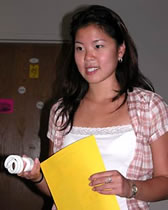
by Noel Gallagher
BERKELEY — As a resident assistant in one of the University of California, Berkeley's residence halls, Judi Quach spends her days getting new students adjusted to college life, from teaching them how to do laundry to passing along tips on how to get along with a cranky roommate.
But this fall, her work also includes encouraging students to buy appliances with the Energy Star symbol, to use energy-efficient compact fluorescent light bulbs and to sign an energy pledge to reduce waste.
"I want to see the numbers at the end of this year reflect that there was a considerable reduction in energy use and increase in energy efficiency," said Quach, a senior in the Department of Environmental Science, Policy and Management. "I want the students to know that their choices make a difference."
Quach is breaking new ground this year as UC Berkeley's first "green intern," working to educate and advise students on how they can conserve energy. She's one of six California college students taking part in a pilot project funded by the ratepayers of California under the auspices of the Public Utilities Commission (PUC).
The Green Campus Program was developed by the Alliance to Save Energy out of the success of its Green Schools Program for K-12 schools. The Alliance to Save Energy, a Washington, D.C.-based non-profit, worked with the California PUC to get a $1.5 million grant for this new two-year program that began in June.
"The program is unique," said Ryan Buckley, the California program associate for the Alliance to Save Energy. "The interns have almost full autonomy, and we rely on their expertise to run a successful program. What we want to see is an energy use reduction on the campuses."
In addition to UC Berkeley, interns are at UC Santa Barbara, UC San Diego, California State Humboldt, California State Sonoma and California State San Bernardino. The interns are paid $10 an hour for 20 hours of work a week and are employees of the alliance.
At UC Berkeley, Quach is taking a pro-active role in educating her fellow students about identifying and reducing energy waste. For example, as a resident assistant, Quach is in a position to talk to new students there about what impact their daily living decisions have on the environment. These include whether to buy a compact fluorescent lamp (CFL) instead of a halogen or regular light bulb, turning off their computer monitors instead of using screensavers, and deciding what kind of small refrigerator to buy.
In these first few weeks of school, Quach said she's been encouraging students in the residence halls to buy Energy Star appliances and is setting up competitions between halls to see which is the most energy-efficient.
And while the victorious residence hall may get a pizza party or a foosball table as a prize, Quach is more interested in changing students' habits over the long term.
"Students should take these ideals and practices with them when they move out," Quach said. "That's the big goal - creating sustainable behavior."
During the week of Sept. 20, Quach and others are staffing tables in front of the residence halls as part of Sustainability Week. Quach will give away energy-efficient compact fluorescent light bulbs and ask students to sign an energy pledge to reduce waste.
In the future, Quach plans to set up a model residence hall room that shows ways students can cut back their energy use.
Judi Quach extols the virtues of energy-saving devices like compact fluorescent bulbs to her fellow students. (photo: Paul Reed)
